I love digging up old music that's still new to me, so when I recently encountered an early Dear Life demo track on Facebook, my curiosity was piqued. I looked around on YouTube and ended up completely flipping out over the fact that I had never even heard of this band before, nor experienced their excellent blend of chunky thrash gone meaty metallic hardcore—eventually changing their name to XXL and gravitating towards a bit of a "rap metal" type of sound that should totally appeal to fans of early E.Town Concrete, Fury of Five, etc. I had ordered a used copy of their lone full-length CD, At Large, within an hour, and—in my constant attempts to shed light on lesser-known music that still deserves more attention—reached out to founding member Mike Tilden (drums) to learn more...
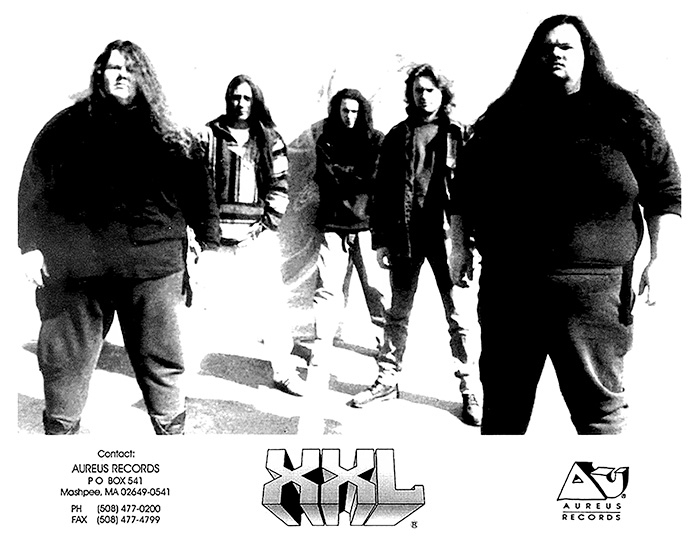
Alright, so you and guitarist Chris Shea formed Dear Life in Brockton, MA in 1989. Shortly thereafter you added Chris' brother Jay on vocals, and then rounded out the lineup with Don Ormond on guitar and Paul Barstad on bass. Give us some basic history on how Dear Life got started in those earliest of days...
Chris and I were co-workers at a flooring warehouse. I was already working there, and when Chris started we were familiar with each other but had never met. So, it was just one of those things—we got together and did some jamming, and during that first day pretty much wrote our first song. It was a song called "Shell Shocked." Chris had the song pretty much written on the guitar, and the two of us put it together in that first jam. I'm pretty sure Chris and Jay had always had it in their minds to put a band together some day, so it was no-brainer that he would be the vocalist. Paul was a close friend of the Shea brothers and was right behind in becoming the bass player at the start, and through the years Paul was our everything guy who was there for us off-and-on multiple times as a bass player, rhythm guitarist, and backing vocalist for countless recordings and live shows. If I had to be honest with you, I'm not really sure how Don came along.
To my knowledge, there are only two sessions from your discography that I've never heard. The first would be the debut four-song demo in 1990, from which only one track ("Follow Me") was later re-recorded. The band's initial influences were the dominant thrash acts of the time period, so did this material follow more of a straight-on thrash style? What details can you share about this demo?
That first demo was very raw, not very well-produced, and, yes, it was a more straight-on thrash style. I suppose—looking back on it now—it wasn't that it was horrible or anything, it was just an inexperienced recording. It did include that first song, "Shell Shocked," and as you mentioned, "Follow Me." "Follow Me" was actually the oldest song that we never dropped from our repertoire, and was probably played at every show we ever did. It was always a fan favorite for some reason, and although we changed up the middle section here and there through the years (even turning it into a reggae part once as a joke), it was always pretty much the same song.
By 1991, if not sooner, your sound was a cross between thrash metal and meaty metallic hardcore. A little north of you around the Boston area there were somewhat comparable hardcore-oriented groups like B'zrker and Bricklayer at that time, so I'm curious if you were already starting to cross over into playing shows with both metal and hardcore bands in the early stages?
We were never really picky about the shows we played, so, yes, we were playing lots of shows with lots of different genres of bands at the time. I think at that stage of the '90s—and even a little later—so much was changing with metal with bands like Korn coming around that there was so much variety out there, you never knew who you would end up on a bill with.
Dear Life actually opened up for the mighty Cyclone Temple in the summer of 1991. I Hate Therefore I Am is one of my all-time favorite thrash albums, so I have to ask if you have any fond memories of that particular show!?
That was one of many, many shows played at the great Derringer's club in Brockton. I'd have to say that I have fond memories of all the shows we ever played there. Derringer's was home for a lot of us local Brockton bands—we even closed the place when they had their final show. That turned out to be a little bit of a mess in the end when some trouble broke out. But back to the Cyclone Temple show, the great thing about a show like that was that the club was so small that people were packed to the max, which always made for a better show. Being a local band, it was great to do a show like that because everyone there pretty much already knew who you were.
Your 1991 demo was tracked at Headroom Recording Studios with Jon Jacobs, who worked on Wargasm's Gasm It demo that same year. What do you recall about those sessions and how the band was continuing to develop by that point?
That was the Who's Got the Problem demo, and really was our first proper demo after that first attempt in 1990. Jon Jacobs was the house soundman at Derringer's and was already familiar with our sound, and that really helps when going into the studio. I later found out that this was actually one of the first projects he ever recorded and produced, which looking back is pretty impressive because at the time you would have thought that he was a seasoned veteran at the board. Aside from the actual recording of the demo, the one thing that sticks out in my mind about these sessions was ordering the absolute biggest pizza I've ever seen in my life. It was the size of a dining room table and I'm not sure I even got one piece down. It's funny the things you remember the most about a certain event from 25 years ago.
Prior to your 1993 demo, Phil Asdot had replaced Paul Barstad on bass; and within that same year, you eventually landed bassist Rich Capozzi, who would remain with the band 'til the end. How did Rich enter the fold?
Before Rich we had a little bit of a revolving door of bass players there for a while. First was Humberto Ribeiro, who was actually there for the Who's Got the Problem demo sessions. Phil Asdot came in for a while and was on the 1993 demo. Both were great players who left for whatever reasons, but aside from a couple of other guys who were there for a short time—and Paul, who was doing a lot with his own bands, too, so he never stayed with us permanently—Humberto and Phil were really the only ones who were with us that made an impact and helped shape what was to become of us in the future.
We had a rehearsal room at a studio in Brockton where, if you were a musician in the Brockton area, you had a studio there at some point. We started having open auditions for bass players, and one day in came Rich. Rich, at the time, was a young kid of 15 or 16 (which was "young" to us seasoned 20-year-olds). I remember him later saying that he was a little intimidated when he did that audition, but he ended up being the one who would last until the end. I think it was really the style that Rich played and the backing vocals he provided that gave us the sound we eventually had leading up to our At Large CD. And aside from that, Rich was also great at sampling, and is the one responsible for what you hear in that respect on At Large.
I believe the name change to XXL happened sometime in '93 as well, is that right? What brought that on? One would assume that you were building upon the very literal dominant presence of Chris and Jay...
Yes, late-'93 or into '94 was probably when we changed the name. I think it's safe to say that the dominant presence of Chris and Jay definitely made it easy to come up with the name XXL. As to why we decided to change it, I'm not sure. It was a good move, though. I think people were more likely to know who we were off of that name as opposed to Dear Life, which didn't really represent anything to do with us.
'93 and '94 were spent laying down a number of demo tracks (later released in 1998 on the Pre-Production/Re-Production CD)—first at the TRIAD Recording Complex in Rhode Island, and then a few more with Joe Clapp at Ultrasound Productions. Talk about those experiences.
What I remember the most about the TRIAD recordings is laying down tracks, sleeping on a couch for a few hours, and then driving to work the next morning. But they were good sessions and it was a good studio. The name of the engineer there eludes me, but he did a good job, which is evident if you listen to that demo from '93. When we found Joe Clapp at Ultrasound, he pretty much became the guy we stayed with until the end whenever we wanted to get any new tracks recorded. He was a good guy that worked with us. It's good to have a guy like that, as opposed to someone who wants to tell you what you want your sound to be.
XXL's sound slowly started to shift with those 1994 recordings—elements of which bring to mind a little of what Boston band Stompbox was doing around that same time, but in more of a groove-laden metal style. Those sessions were also starting to introduce some Rage Against the Machine-like lead guitar textures.
The first time we ever heard Rage Against the Machine actually goes back again to Derringer's and Jon Jacobs doing sound there. He was playing their debut album on the board while we were setting up to do a gig, and it wasn't too long after that when they blew up and became huge. I think our groove-laden metal style should mostly be credited to Rich's bass playing. He was into the early 311 stuff at the time, and was also a huge Fishbone fan.
Frank "Pedal" Ravisi replaced Don Ormond on guitar at some point. Had that already happened by the time of those '94 sessions? What impact did that have on the lineup?
Frank Ravisi replacing Don Ormond was more the result of what would start happening with our association with Aureus Records. I'll touch on that with the next question...
Who's Got The Problem video. Filmed in 1995. Special thanks goes to Ken Tilden for getting it transferred from the bare bones of a VHS recording.
Posted by XXL on Saturday, July 26, 2014
1995 was an interesting year, as XXL had secured some type of relationship with Aureus Records—recording a five-song demo for the label, as well as filming a video for "Who's Got the Problem." What's the story there?
The Aureus Records association came about when the owner—a former A&R guy for CBS Records—showed up at the Brockton rehearsal studios looking for demos of local bands. We had a good relationship with Mark Horne, who ran the studios, and he gave him our demo, which eventually led to him coming to see us jam at practice. He seemed to like us a lot and began working with us. It was all good for the most part, but Don kind of got pushed out of the mix because it was suggested to us that he didn't fit with our "look." It was the wrong thing to do, but Don did later end up back with us in the end, which says a lot about his character. Don leaving led to finding Frank Ravisi, who had an interesting style of Whammy pedal guitar playing—hence the nickname "Pedal."
All the right things were happening with Aureus. They put in all the money for demo recordings, photo shoots (pictures I never actually saw and have no clue as to where they are), and the filming of the video. I'd have to say that filming the video was probably one of the best experiences out of everything that ever happened with XXL. It was done at a soundstage in Connecticut. It was the first experience any of us had at something like this. The mosh pit you see in the video was made up of our biggest followers from Brockton, who drove down in a van with a keg of beer.
I guess there were a couple of reasons it all fell through. When someone's putting a lot of money into you, they sometimes want you to do certain things that you might not agree with, and through it all, saying "No." too many times just eventually made them walk away. But aside from that, there was a lot of hip-hop making the scene in a big way, and Aureus eventually went more in that direction.
XXL also played Wargasm's final show in 1995, alongside fellow unsung Brockton metal greats Triphammer. That must have been a great show.
It was always a good show when you played with Wargasm. They were without a doubt the best metal band out of Brockton, and you knew there would be a packed house for them whenever they played. That final show was no exception. The problem with me not remembering too many specifics about these big shows is that I was driving the equipment van at the time, so I didn't always hang around too much. [Editor's note: Jay Shea also contributed vocals to the song "Meat" on Wargasm's Suicide Notes album in 1995.]
The following year, Frank left the group and Tony Patterson was added as a second vocalist. Former Dear Life bassist Paul Barstad then came back in on second guitar, and this six-piece lineup commenced work on XXL's lone full-length album, At Large. This era was continuing to solidify your gradual evolution towards a "rap-core" (or "rap-metal") type of sound.
Frank left not too long before we hit the studio to record At Large, due mostly to our style change. The basic tracks for At Large were for the most part done by the four-piece of Chris, Jay, Rich, and myself. At that time, Paul was always our live second guitarist, and Tony (Tee) Patterson added some live flavor to our more rap-type stuff. The influence of rap was always there. Chris and Rich were always fans of the old N.W.A. stuff (and the later Dr. Dre and Ice Cube stuff as well), and also Public Enemy. And as I mentioned before, the knowledge Rich had at sampling gave us an opening to explore that kind of sound.
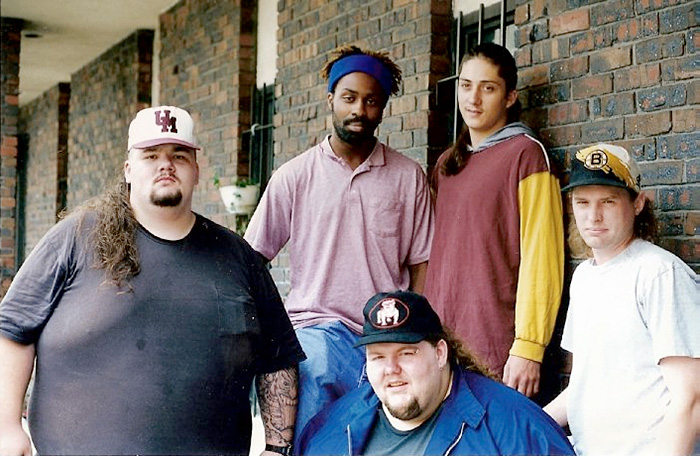
At Large was recorded once again with Joe Clapp. The album actually has somewhat of a rawer, dryer sound to it than some of the demos. Was that an intentional aesthetic shift?
The demos we did for Aureus were done in a studio of their choosing. This goes back to mentioning how people want to tell you how your sound wants to be, as opposed to how you want it to be. We were being too overproduced, instead of having the more raw sound that we wanted. Joe Clapp already knew what we wanted.
You guys were constantly reworking and tweaking arrangements and re-recording songs throughout your time together. A small handful of the album tracks even date all the way back to the Dear Life days. It must have been a very detail-oriented process.
It's funny that as much as our style shifted through the years, we still managed to get stuff from our thrashier roots onto the one full-length CD that we recorded. There was no way that "Follow Me" wasn't going to make it onto At Large. It was our biggest fan favorite, like I mentioned before. "No Time" (previously called "Got No Time") was our other earliest song to make it, and was a good example of the thrash sound we had before. I don't think too much was changed on that other than the lyrics. The At Large version of "Follow Me," though, was probably night and day compared to our first demo recording of it. "Who's Got the Problem" stuck with us through those couple of years, too—probably because we did the video through Aureus and were still in association with them as we started recording At Large. You'll notice, though, that the At Large version is different in part from the video. A lot of the reason for that was that "Who's Got the Problem" was written when Frank was in the band. Frank provided a very distinct style of guitar solos when he was with us. After he left, a lot of the stuff we did was more based on riffs and middle sections of mosh parts (although we did lift a sample of his guitar for "Open Your Eyes"). I don't think we ever had too much detail in our writing or approach to anything, it was usually Chris playing around with a riff and the rest of us coming into it and seeing where it went.
The first pressing of At Large was self-released on the band's own label, 400+ Records—so named as another nod to the Shea brothers' considerable stature. What was it like to go the D.I.Y. route?
We ended up putting At Large out ourselves after we started getting frustrated with Aureus dragging their feet on anything to do with us. Chris was already talking about trying to put his own label together as a way of trying to help put releases from local artists out. It seems to go a lot smoother and less stressful when you're doing things your own way as opposed to being dictated to. The thing that keeps it from going too far is having the finances to do stuff for yourself. Unfortunately, you sometimes need someone like Aureus Records to put that kind of money into you. Money is probably the reason that so many deserving bands in the world never see the light of day out of their local scene.
Within a year or so, At Large was re-released by Shredded Records with different cover art. How did that come about?
It wasn't so much re-released, that was actually the release we were supposed to have, period. Shredded was to be Aureus' metal label. I'm not sure if there was ever anything other than At Large on Shredded, because like I said, they went the hip-hop route and walked away. We had nothing to do with the cover art or anything, and we were never happy with how they wanted the packaging to look. It seemed a little too flashy for what we were looking for. We had advance copies before our own 400+ release was made, which was probably what led to the decision of making our own version. Whatever the case, when Aureus walked away, we printed about 1,000 copies of the 400+ version. I don't know who ended up with the bulk of the Shredded releases, but they end up being sold on eBay or Amazon sometimes. And they sell, too, apparently.
The record's thanks list mentioned some bands like Biohazard and Fury of Five that were a great match for what XXL was doing at the time. There was actually a lot happening along those lines in New Jersey back then with Fury of Five, E.Town Concrete, Second to None, etc. Was XXL catching on in those circles at all, or sharing the stage with any of those bands?
We did shows with Biohazard, again at Derringer's in Brockton. And even though I don't remember specifically, I'm sure we did a couple with Fury of Five also. We tried to make sure that bands who were cool to us when we played with them got a little recognition from us.
Also on 400+ Records, the final XXL recordings appeared on the Brockton-centric compilation CD City of Champions in 1997. I've not been able to track down a copy of that disc, but it seems like there was a pretty cool scene of lesser-known bands happening. What was it like putting that collection together, and what were some of the other bands from that niche that never really got the proper amount of attention?
City of Champions sort of fell in line with how Chris put together 400+ Records: as a way to get local bands out there. The majority of the bands on City of Champions were from Brockton. Everyone did an original and a cover. A couple of good bands from back then were No Regret (which was Paul Barstad's band) and Brawl Park (who I believe you've recently come into contact with). There was also a track added by local rap band Cooler Than Smack, who I believe is still active.
XXL came to a close in 1999 after a 10-year run. What brought things to an end?
I think the frustration of spending so much time with someone like Aureus Records—and then having it all fall flat on its face—kind of put a damper on the enthusiasm we had. Rehearsals started becoming a time to sit around for an hour and not play music. Before the band actually broke up, Chris and I put together a CD store that we ran, but unfortunately as the progression of downloaded music came into play, stores like that were dying, so it didn't work out.
Jay Shea passed away in the summer of 2010, and I think Chris had passed a few years prior to that. You were the one who was there with the brothers from the beginning, so maybe we should end out by having you just share some insight on Chris and Jay—not just with regard to the band, but as people—and the impact they made and what they meant to you...
I had lost touch with the Shea brothers after the band, so unfortunately their passings were news that I got after the fact. That might have been different if they had been around for the outburst of Facebook. They were a couple of guys who were straight and to the point when expressing what they wanted. They weren't always easy to get along with, but as friends they would have been there for you if you needed them. Looking back on the band, I learned about how to do certain things and how not to do certain things... especially when someone from the outside is trying to push you along. But all in all, the entire existence of Dear Life/XXL—through the good and the bad—was an experience that I'm grateful to have had.
***
Check out more goods from the Dear Life/XXL archives on Facebook.

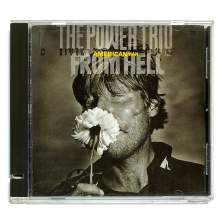
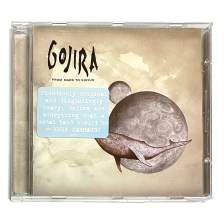

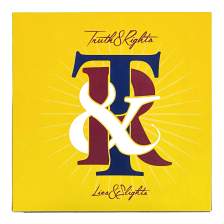
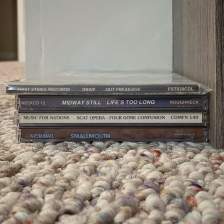
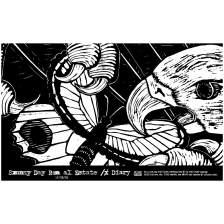
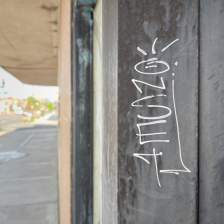
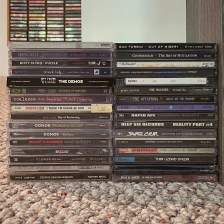
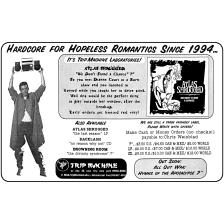
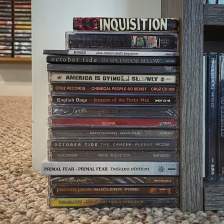
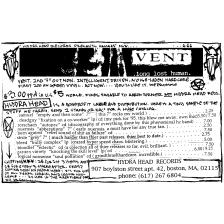
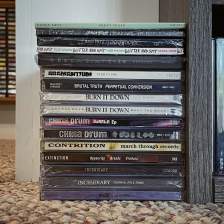
Comments
Great article! Ken Tilden (Mike’s father)
8.3.2016 | By Ken Tilden